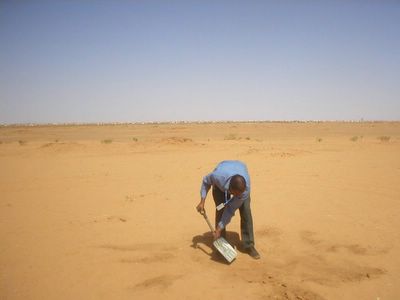You requested a description of life in Sudan--especially without money. That's a pretty tall order, as Sudan is the largest country in Africa, with a recorded history that extends back almost 5,000 years into the past and a melange of cultural histories that reflect almost the entire continent of Africa.
Let me start by dismissing the "without money" issue. The bureaucratic glitch that left me out in Darfur with only $200 has been resolved, as I always knew it would be. I am somewhat embarrassed that this was revealed in a public forum as it is merely a symptom of the fact that administration is a difficult business, and the administration of a world wide organization is especially so. I fear that I may appear petty complaining about only having $200 when the vast majority of people who surround me do not see $200 in the entire year.
The nature of life in Sudan, as is the case anywhere, depends very much on who you are and where you are. My life, and therefore my perceptions, are very much constrained by the security and work situation. We live under a 9 pm to 7 am cerfew, during which time we are required to be in the "guesthouse" where most of us live. Our work day is from 8 am to 7 pm. You can see that this leaves very little time during the day when I am out of what I have come to think of as my "United Nations Bubble." I really have very little face to face contact with Sudan.
That is not to say that life within these constraints is in any way boring or uninteresting.
In my office are people from Zimbabwe, Kenya, Italy, Switzerland, Spain, and Denmark, as well as a number of Sudanese, some from the local area and some from other parts of the country. In addition, I am in daily contact with people from at least a dozen other countries around the world. It has been in many ways an intensely interesting and mind expanding experience.
I am also finding the work that I am doing to be both facinating and useful. As the Geographic Information Systems Officer for North Darfur I am engaged in an effort to push modern information management technology up to and beyond previous limits. Meeting the challenges that crop up has expanded both my personal capabilities and the capacity of the Official and Non-Governmental Organizations with which I work. I am deriving a great deal of satisfaction from what we are doing here.
And I believe that the work we are doing is important. The situation here is extremely complex, and it is well above my pay grade to make judgements on where the fault for all the human suffering in this unhappy region lies. I am convinced that the simplistic explanations I received from the media (evil Arab militia, evil government) are far from the whole story, but the distorted lens through which I see the situation gives me very little confidence that I have a great deal of insight into the causes or solutions.
What is clear is that there are a very large number of human beings who, through absolutely no fault of their own, are suffering tremendous privations. The conflict has driven some 2.1 million people from their homes and caused them to seek refuge anywhere they can find it. No matter the rights and wrongs of the situation, the plight of these people cannot be ignored in good conscience.
One of the principal activities in which I have been engaged since arriving here is establishing a new camp to take the overflow of internally displaced persons (IDP's in Humanitarian Speak) who have arrived in the Abu Shouk IDP camp in the last four months, mainly from the Tawila area. In December there were around 50,000 people in the camp, which was then at full capacity. Since then an estimated 40,000 additional people have arrived, creating a real health and administrative crisis. Finding a new location has been very difficult because of the physical and political constraints, mostly revolving around water and land ownership rights. Just try to imagine what would happen if 40,000 refugees showed up in 56572. Where would you put them? Whose farm would you requisition? The same questions arise here, but are complicated by the fact that there is very little water available anywhere. This photo shows my collegue, Clifford, marking the corner of the area that was finally agreed upon. The old camp can be seen in the background.
The next photo is some of the kids who will live in the new camp. Nice kids. The giggled a lot and really loved seeing their image on my digital camera.
Next there is a picture of the shelters in the existing camp. These people have received the distribution of what we refer to as non-food items (NFI--plastic sheeting, jerry cans, buckets--the basics that make life possible). Note the USAID logo on the shelter.
These conditions are about the average for the camp. Some of the IDP's that have been there for the longest have built mud brick houses that are more secure and roofed with plastic sheeting. Most of the recent arrivals have not yet received any NFI distributions and are living in shelters constructed of brush. It keeps the sun off, but the rains will soon be here.
The final picture illustrates the biggest problemof all: water. This is the daily line-up of water containers waiting the water tanker to deliver the daily water rations. El Fashir is very lucky because it sits on a quite plentiful aquafer which delivers ample supplies for the people who are here. Reports have recently emerged from further west that water rations have been reduced to 2 liters (about 2 quarts) per person per day in some of the camps near the Chad border. This is for all uses--drinking, cooking and bathing (not that there is much of that going on). This is in a climate that reaches 110 degrees F. every afternoon. I am in the habit of drinking four 1.5 liter bottles of water every day just to stay hydrated. One bottle of such water sells for approximately one US Dollar in the local markets. Not many local people are able to afford such luxury.
A final note, then I have to get busy. We are now anticipating the rains. Normally they start sometime in June. But last year the rains failed almost completely. I am told that it only rained two times in Al Fashir last summer, when it normally rains almost daily through the end of August. The result was that almost no food was grown locally.
Needless to say, there is a great deal of anxiety about what will happen in the next month. If the rains fail again this year there is a prediction that another million people will be forced from their homes to set off in search of food. Pray for rain. We certainly are doing so here.
I hope this responds to your request. I hope I can send further impressions as they develop.
Regards,
doug brown
Everything We Know About 'Bitchat,' the Internet-Free Messaging App
-
The new app offers peer-to-peer messaging, but it works over Bluetooth.
52 minutes ago



No comments:
Post a Comment